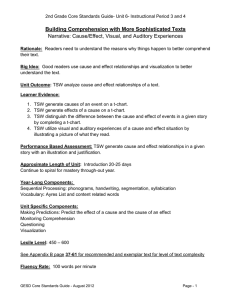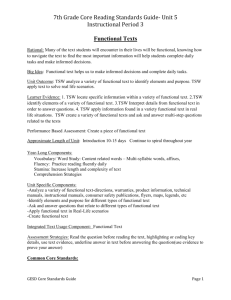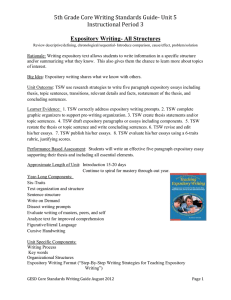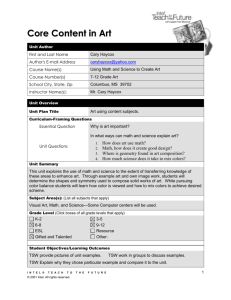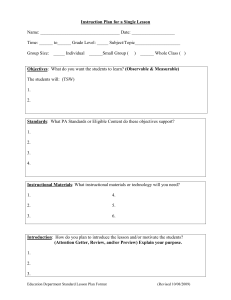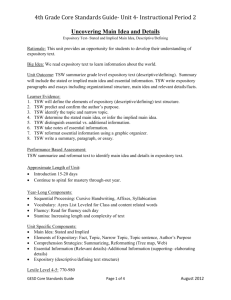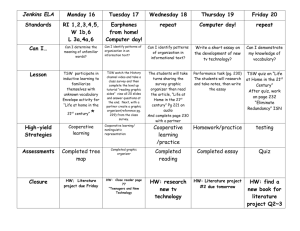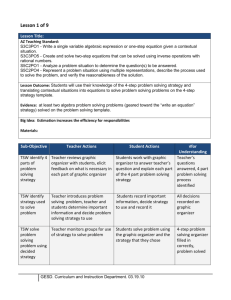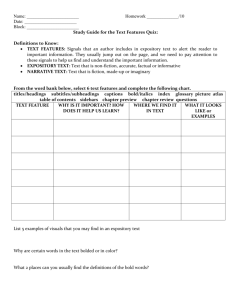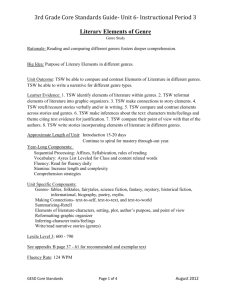3rd Grade Core Standards Guide- Unit 5
advertisement
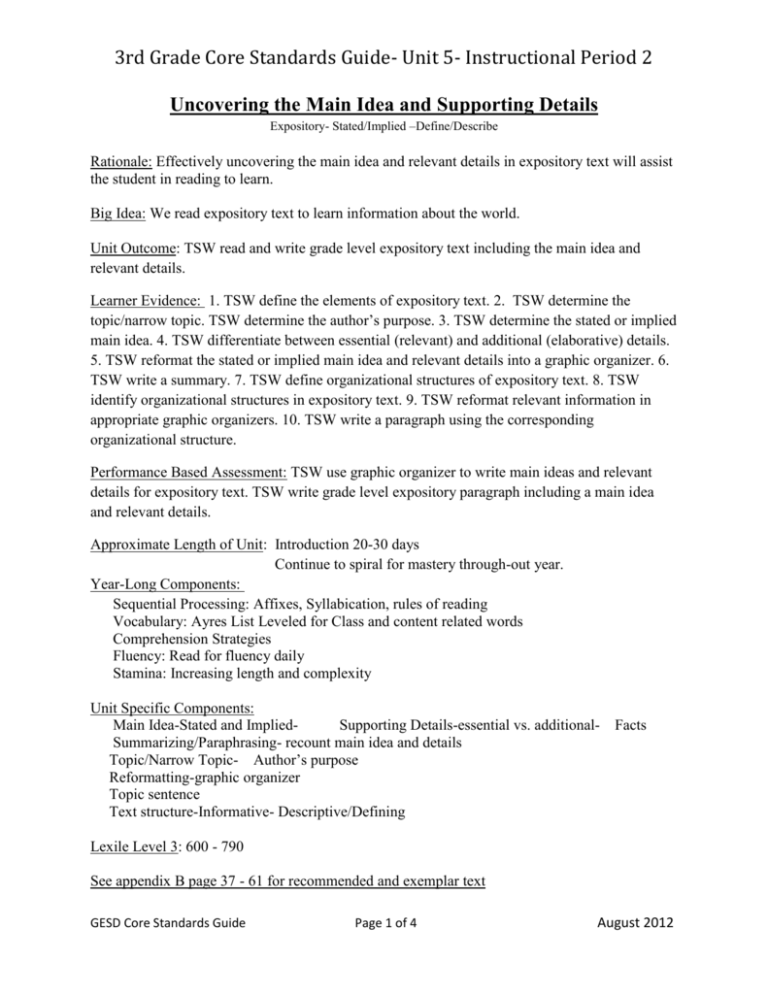
3rd Grade Core Standards Guide- Unit 5- Instructional Period 2 Uncovering the Main Idea and Supporting Details Expository- Stated/Implied –Define/Describe Rationale: Effectively uncovering the main idea and relevant details in expository text will assist the student in reading to learn. Big Idea: We read expository text to learn information about the world. Unit Outcome: TSW read and write grade level expository text including the main idea and relevant details. Learner Evidence: 1. TSW define the elements of expository text. 2. TSW determine the topic/narrow topic. TSW determine the author’s purpose. 3. TSW determine the stated or implied main idea. 4. TSW differentiate between essential (relevant) and additional (elaborative) details. 5. TSW reformat the stated or implied main idea and relevant details into a graphic organizer. 6. TSW write a summary. 7. TSW define organizational structures of expository text. 8. TSW identify organizational structures in expository text. 9. TSW reformat relevant information in appropriate graphic organizers. 10. TSW write a paragraph using the corresponding organizational structure. Performance Based Assessment: TSW use graphic organizer to write main ideas and relevant details for expository text. TSW write grade level expository paragraph including a main idea and relevant details. Approximate Length of Unit: Introduction 20-30 days Continue to spiral for mastery through-out year. Year-Long Components: Sequential Processing: Affixes, Syllabication, rules of reading Vocabulary: Ayres List Leveled for Class and content related words Comprehension Strategies Fluency: Read for fluency daily Stamina: Increasing length and complexity Unit Specific Components: Main Idea-Stated and ImpliedSupporting Details-essential vs. additional- Facts Summarizing/Paraphrasing- recount main idea and details Topic/Narrow Topic- Author’s purpose Reformatting-graphic organizer Topic sentence Text structure-Informative- Descriptive/Defining Lexile Level 3: 600 - 790 See appendix B page 37 - 61 for recommended and exemplar text GESD Core Standards Guide Page 1 of 4 August 2012 3rd Grade Core Standards Guide- Unit 5- Instructional Period 2 Fluency Rate: 124 WPM Academic Vocabulary: Main idea, supporting details, facts, summarizing/paraphrasing, topic/narrow topic, author’s purpose, topic sentence, and informative text Integrated Text Usage Component: This unit requires students to toggle all text types and lengths flexibly. Provide students with narrative, informative, poetry, and functional text. Students should use comprehension strategies on all types of text. Assessment Strategy: Read the questions before reading the text Common Core Standards: 3.RI.1. Ask and answer questions to demonstrate understanding of a text, referring explicitly to the text as the basis for the answers. 3.RI.4. Determine the meaning of general academic and domain-specific words and phrases in a text relevant to a grade 3 topic or subject area. 3.SL.2. Determine the main ideas and supporting details of a text read aloud or information presented in diverse media and formats, including visually, quantitatively, and orally. 3.RI.2. Determine the main idea of a text; recount the key details and explain how they support the main idea. 3.RI.7. Use information gained from illustrations (e.g., maps, photographs) and the words in a text to demonstrate understanding of the text (e.g., where, when, why, and how key events occur). 3.W.2. Write informative/explanatory texts to examine a topic and convey ideas and information clearly. a. Introduce a topic and group related information together; include illustrations when useful to aiding comprehension. b. Develop the topic with facts, definitions, and details. c. Use linking words and phrases (e.g., also, another, and, more, but) to connect ideas within categories of information. d. Provide a concluding statement or section. GESD Core Standards Guide Page 2 of 4 August 2012 3rd Grade Core Standards Guide- Unit 5- Instructional Period 2 3.W.4. With guidance and support from adults, produce writing in which the development and organization are appropriate to task and purpose. 3.W.10. Write routinely over extended time frames (time for research, reflection, and revision) and shorter time frames (a single sitting or a day to two) for a range of discipline-specific tasks, purposes, and audiences. 3.W.7. Conduct short research projects that build knowledge about a topic. 3.RI.8. Describe the logical connection between particular sentences and paragraphs in a text (e.g., comparison, cause/effect, first/second/third in a sequence). 3.RI.9. Compare and contrast the most important points and key details presented in two texts on the same topic. 3.RI.10 By the end of the year, read and comprehend informational texts, including history/social studies, science, and technical texts, at the high end of the grades 2-3 text complexity band independently and proficiently. 3.SL.4 Report on a topic or text with appropriate facts and relevant descriptive details, speaking clearly at an understandable pace. 3.SL.6 Speak in complete sentences when appropriate to task and situation in order to provide requested detail or clarification. Arizona State Standards: S2C1PO7 Distinguish between/among fiction, nonfiction using knowledge of their structural elements. R-S3C1PO1 Identify the main idea and supporting details in expository text. R-S3C1PO2 Locate facts in response to questions about expository text. R-S3C1PO3 Locate specific information by using organizational features (title, table of contents, headings, captions, bold print, key words, glossary, indices, italics, keywords) in expository text. R-S3C1PO4 Use a variety of sources (trade books, encyclopedias, magazines, atlases, almanacs, electronic sources, textbooks) to answer specific questions, and/or gather information. R-S3C1PO5 Interpret information from graphic features (maps, tables, diagrams, timelines, illustrations, charts) of expository text. W-S3C6PO1 Paraphrase information from at least one source W-S3C6PO2 Organize notes in a meaningful sequence W-S3C6PO3 Write informational reports that include main ideas and relevant details GESD Core Standards Guide Page 3 of 4 August 2012 3rd Grade Core Standards Guide- Unit 5- Instructional Period 2 GESD Core Standards Guide Page 4 of 4 August 2012
